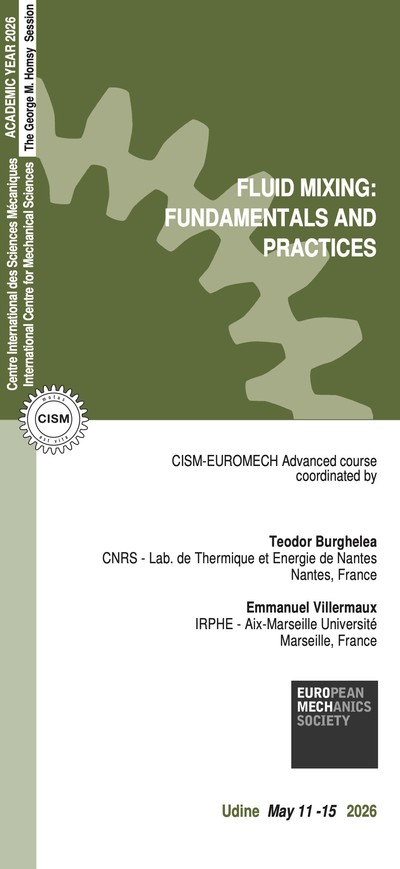When browsing the news, one perceives a rather widespread fear of “artificial intelligence forcing humans into unemployment”. As a counterpoint to this fear, within the proposed course, we will demonstrate that daring more intelligence can aid human engineers to excel by relieving them from repetitive tasks and allowing future pioneers to better exploit their creativeness for the benefit of both the engineer and the end-user of the product. Just like “classic” numerical analysis, artificial intelligence can play an integral role in finding reliable and reproducible answers to mechanical design questions without depending on costly experiments or on decades of engineering experience. In this spirit, the course will discuss recent advances in artificial intelligence and their application to engineering design / computational mechanics. Topics will span the entire design and analysis process from geometry representation via numerical analysis to design optimization, including data-enhanced, knowledge-enabled (i) geometric design, (ii) predictive analysis, and (iii) optimization of complex mechanical systems.
The course sets out to provide a basic understanding of the classic engineering design process and identify potential usage of artificial intelligence in this context. We will proceed by detailing basic theory of machine learning concepts suitable for (i) geometry representation, (ii) model order reduction, (iii) optimization, and (iv) uncertainty quantification.
- We will demonstrate how Variational Autoencoders (VAE) can be employed to learn low-dimensional, yet feature-rich shape representations;
- We will build the foundations of Reduced Order Modelling and its application to digital twins;
- We will employ Gaussian process regression to create a non-parametric scalar regression model of objective functions based on probability distributions;
- We will introduce the concept of physics-informed neural networks that aim to connect the world of data-driven and knowledge-based modelling and extend this approach to spline-based approaches using IgAnets;
- We will demonstrate several operator learning techniques like DeepONets
- We will perform design optimization based on reinforcement learning, an experience-driven, autonomous way of learning.
The course participants will not only be introduced to the basic concepts, but will also be pointed to open-source implementations of the presented concepts that will allow them to directly include the newly studied methods into their everyday research. To further facilitate this transfer, the course will discuss examples from mechanics, where these approaches have been successful.
The course is addressed to anyone new to machine learning in the mechanics community, be it a doctoral student, a young researcher, or even a senior researcher, who would like to try out something new.
Hughes, T.J., Cottrell, J.A. and Bazilevs, Y., 2005. Isogeometric analysis: CAD, finite elements, NURBS, exact geometry and mesh refinement. Computer methods in applied mechanics and engineering, 194(39-41), pp.4135-4195.
Garnier, P., Viquerat, J., Rabault, J., Larcher, A., Kuhnle, A. and Hachem, E., 2021. A review on deep reinforcement learning for fluid mechanics. Computers & Fluids, 225, p.104973.
Fuhrländer, Mona, and Sebastian Schöps. "Yield Optimization using Hybrid Gaussian Process Regression and a Genetic Multi-Objective Approach." Advances in Radio Science 19, no. B. (2021): 41-48.
Steven L. Brunton, J. Nathan Kutz: Data-Driven Science and Engineering: Machine Learning, Dynamical Systems, and Control; Cambridge University Press, 2022.
Romor, Francesco, Giovanni Stabile, and Gianluigi Rozza. "Non-linear manifold ROM with Convolutional Autoencoders and Reduced Over-Collocation method." arXiv preprint arXiv:2203.00360 (2022).
T. Rashid: Make Your Own Neural Network. ISBN 978-1530826605.
Raissi, Maziar, Paris Perdikaris, and George E. Karniadakis. "Physics-informed neural networks: A deep learning framework for solving forward and inverse problems involving nonlinear partial differential equations." Journal of Computational physics 378 (2019): 686-707.
5 lectures on: Geometric design in shape optimization
Review of classic engineering design process; Geometry representation in engineering design from classic spline-based via trivariate microstructures to Variational Autoencoders (VAE); Use of geometry representation in optimization; Applications in production engineering.
6 lectures on: Shape optimization using machine learning approaches
Deep Reinforcement Learning for predicting a numerical solution and for decision-making in optimization and control; Applications from Computational Fluid Dynamics.
6 lectures on: Physics-informed neural networks, geometric design
Brief introduction of the isogeometric analysis (IgA) paradigm; Introduction to physical-informed neural networks (PINN); Introduction to IgaNets; Numerical examples on side-by-side use of simulation- and learning-based analysis.
6 lectures on: DeepONets
Operator learning techniques using multi-layer perceptrons, convolutional networks, and attention-based architectures; DeepONets; Neural Operators; Hands-on tutorials; Application highlights in scientific computing, climate modeling, design optimization and optimal control.
6 lectures on: Model Order Reduction as a bridge between HPC, Data Science and Machine Learning towards Digital Twin(s)
Foundations of Reduced Order Modelling (ROM); Digital Twin construction; Offline-Online computing; Inverse problems; Open source software libraries; Applications in industry, medicine and environmental sciences.
6 lectures on: Gaussian Process Regression, Uncertainty Quantification
Simulation-based robust design workflows for engineering products; Introduction to different methods for uncertainty quantification, e.g. failure probability estimation, local and global sensitivity analysis etc.; Kriging (i.e. Gauss process regression); Illustrative examples from electrical engineering.
ADMISSION AND ACCOMMODATION
The course is offered in a hybrid format giving the possibility to attend the course also by remote (on Microsoft Teams platform). On-site places are limited and assigned on first come first served basis.
The registration fees are:
On-site participation, 600.00 Euro + VAT*
This fee includes a complimentary bag, five fixed menu buffet lunches, hot beverages, downloadable lecture notes.
Deadline for on-site application is August 18, 2023.
Online participation, 250.00 Euro + VAT*
This fee includes downloadable lecture notes.
Deadline for online application is September 6, 2023.
Application forms should be sent on-line through the following web site: http://www.cism.it
A message of confirmation will be sent to accepted participants.
Upon request a limited number of on-site participants can be accommodated at CISM Guest House at the price of 35 Euro per person/night (mail to: foresteria@cism.it).
* where applicable (bank charges are not included) Italian VAT is 22%.
CANCELLATION POLICY
Applicants may cancel their registration and receive a full refund by notifying CISM Secretariat in writing (by email) no later than:
- August 18, 2023 for on-site participants (no refund after the deadline);
- September 6, 2023 for online participants (no refund after the deadline).
Cancellation requests received before these deadlines will be charged a 50.00 Euro handling fee. Incorrect payments are subject to Euro 50,00 handling fee.
GRANTS
A limited number of participants from universities and research centres who are not supported by their own institutions can request the waiver of the registration fee and/or free lodging.
Requests should be sent to CISM Secretariat by July 18, 2023 along with the applicant's curriculum and a letter of recommendation by the head of the department or a supervisor confirming that the institute cannot provide funding. Preference will be given to applicants from countries that sponsor CISM.





